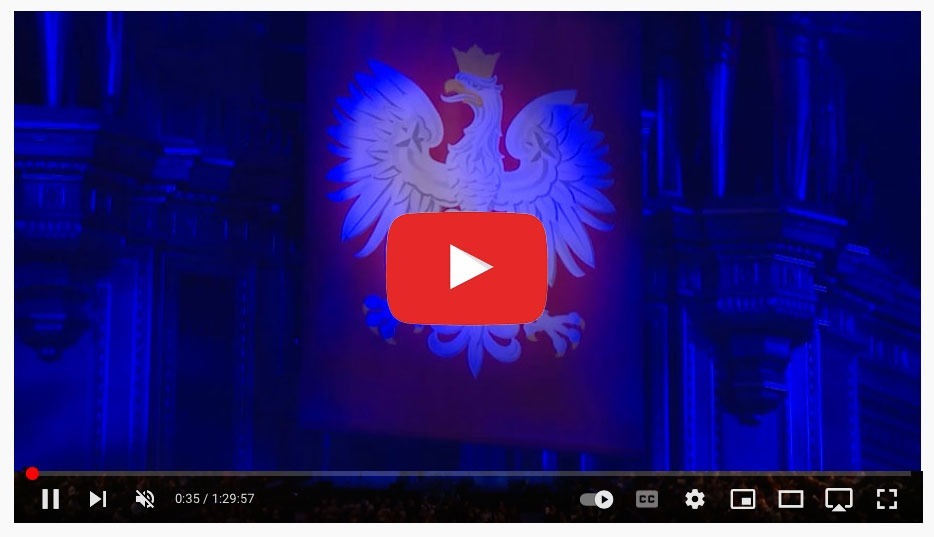
Make a donation
to PHS
Introducing
The Institute
of Polish
Military History
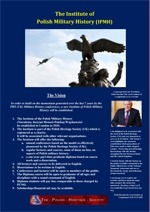
A message from our President, General Lord Guthrie of Craigiebank
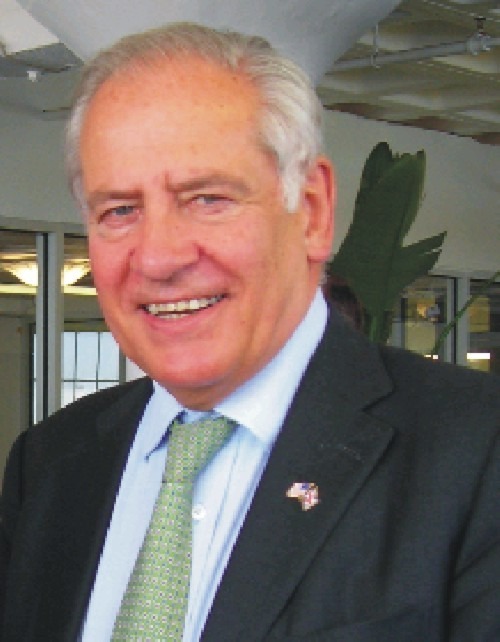
'I am delighted to be associated with the work of the Polish Heritage Society and very honoured to serve as its President. The Society's work highlights the enormous contribution which generations of Poles have made to their adopted country. Preserving and celebrating that heritage will only further strengthen the ties between Poland and the United Kingdom.
I worked closely with the Society on the project to build a memorial to the Polish Forces at the National Memorial Arboretum and saw at first hand the energy and dedication of those involved.
I encourage you to explore this website and learn about the many other projects the Society has sponsored. Do please contact us if you would like to be involved in any way'.
General The Lord Guthrie of Craigiebank GCB LVO OBE
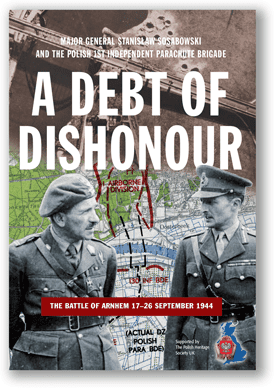
A Debt of Dishonour is a unique documentary film dedicated Major General Sosabowski and all ranks who served in the 1st Polish Independent Parachute Brigade Group and to their Comrades-in-Arms of the 1st British Airborne Division that fought in the ill-fated “Operation Market Garden” at Arnhem and Driel during September 1944.

The Polish Heritage Society
Battle of Britain memorial for Doncaster
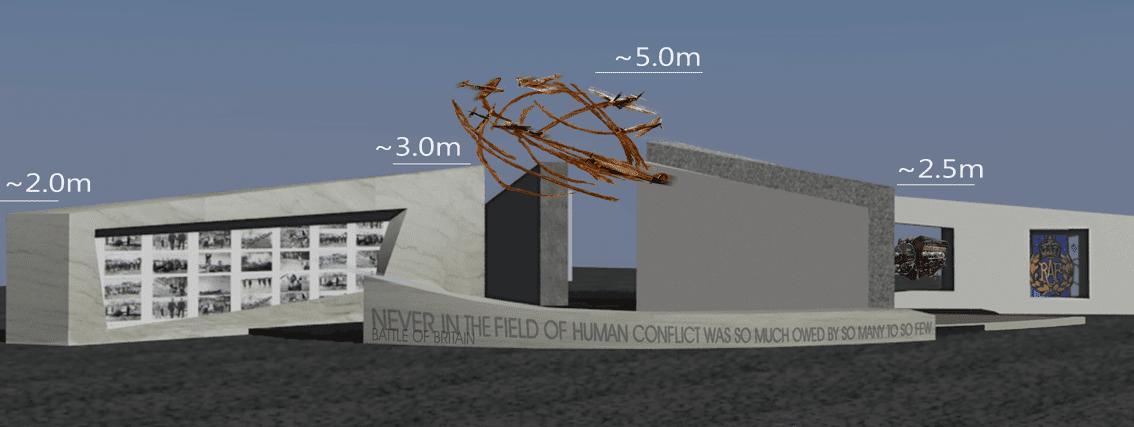
It has been announced that a Battle of Britain monument is to be built in Doncaster.
It will be located at the South Yorkshire Aircraft Museum (Aeroventure) in Dakota Way and construction will commence at the end of the year.
A Battle of Britain Historical Society initiative, it will be the second of five such memorials planned for erection in strategic parts of the British Isles, with a further one planned for Scotland, another in Northern Ireland and the final monument for Wales.
The originator of the national project, Bill Bond MBE, explains: “The Battle of Britain was a pivotal air battle that changed the course of world history, and as such should be remembered and celebrated throughout the land.
Sadly, though, as the memory dims so does the interest, but far more alarmingly, children are growing up totally ignorant about the debt owed to The Few. It is a well known fact that if lessons are not learnt from history then mistakes of yesteryear can easily be repeated.
Had the Nazis managed to defeat the R.A.F. Fighter Command during those dark days of 1940 the war would have been lost. In an occupied Britain an estimated 1,000,000 men, women and children would have been sent to Nazi death camps, with millions more sent as slaves to mainland Europe.
It is our Society’s intention to invite schools to send parties of children to see the monument and learn of the incredible exploits of the young men of the R.A.F., some barely out of school themselves, who fought so valiantly against massive odds to ensure the survival of this country and the preservation of all that we hold so dear.”
Mayor of Doncaster, Peter Davies, said: "News that a Battle of Britain monument is coming to the town is really tremendous, and a great honour for Doncaster. The borough has a very rich aviation heritage, going right back to the dawn of flying in Britain. RAF Doncaster was the original home of famed 616 Battle of Britain Squadron, called the South Yorkshire squadron, and was an important base during the war. It is, of course, now the site of Aeroventure so it therefore seems very fitting indeed that the memorial should be based there, right next to the Aircraft Museum.
"The monument is a wonderful addition to Doncaster's existing attractions, including the last surviving Vulcan, the home of Bomber Command in Bawtry, the war graves on Hatfield Moor and the Aeroventure Museum itself.
"The monument will be of national importance, attracting young and old from across the country to pay tribute to those brave airmen who fought to save this country from Nazi tyranny in 1940."
Also involved in the plans to bring the monument to Doncaster were the trustees of the South Yorkshire Air Museum. Its chairman, Frank Donnelly, was delighted when first approached by the Historical Society: “The Museum will be deeply honoured to host this ‘National Monument’ to celebrate and commemorate the magnificent achievement, against all odds, by ‘The Few”, who altered the course of history of the western world, and saved the British peoples from certain tyranny in 1940. The Museum’s visitor numbers will increase immeasurably, and strengthen the Museum’s ability to present significant aviation history to a world audience.”
The monument will cost £600,000 to build and a campaign is to raise the money is already underway.
The Chairman of the Fund Raising Committee, Sir Malcolm Guthrie Bt., has this to say: “My late father, Sir Giles, was a decorated Fleet Air Arm pilot seconded to Fighter Command for the Battle of Britain, so was one of ‘The Few’. I never remember him saying anything about it and indeed, to my shame, only learned of his participation a few years ago.
This project is very dear to my heart and I am proud to be a small part of the building of this fine monument, a fitting tribute not only to my father but to all those brave young men, many of whom never saw or benefitted from the peace that they gave to us when they made the ultimate sacrifice.”
The construction work of the monument should begin in January 2013 and is expected to last for eight months. Unlike the Society’s existing monument in London, the Doncaster structure will be very much an educational aid, with a comprehensive display of pictorial information.
An exciting feature, quite unique for a monument such as this, will be the siting of an outdoor, widescreen display screen upon which action footage from the Battle will be shown. Although complementing the main structure it is expected to be a real draw for schoolchildren visiting the memorial.
The names of all 2950 Allied aircrew who flew operationally during the Battle will be inscribed on large granite slabs, comprising the main section of the structure.
One of the names is that of Sergeant Pilot Stanley Andrew, from Swanland in the East Riding, killed in action during the Battle. His brother Mark says: "My brother was one of at least 105 brave Yorkshiremen who served as aircrew during the Battle of Britain.
I well remember as a 10 year old the loss to our family and friends in September 1940, standing with my parents at his graveside in the North Ferriby churchyard, his coffin having been taken there on a horse drawn cart by a local farmer, and the guard of honour from the Royal Air Force.
I joined the Battle of Britain Historical Society to make sure he was remembered in our school with a memorial plaque. When this was presented the Head Teacher told me that although his name was on the war memorial, this was the first time they knew details of his service in the RAF Volunteer Reserve and during the war from 1 September 1939.
So this new Monument will provide an opportunity for schools like Swanland to bring the present pupils to visit and better understand how ‘The Few’ of the Battle of Britain prevented the invasion of our country, thus allowing them to enjoy the life they have today, free of tyranny. "
The monument is, of course, an international tribute, in that ‘the Few’ emanated from 14 different nations. Apart from Britain, Poland provided more aircrew than any other country. Dr Marek Stella-Sawicki, Chairman of The Polish Heritage Society, commented: “When asked by Bill Bond of the Battle of Britain Historical Society to take on the prestigious role of the Chairmanship of its Advisory Committee, I felt deeply honoured to have been asked, and it took me less than 10 seconds to make up my mind!
There were 147 Polish pilots involved in BOB representing 5% out of a total of 2,945 RAF aircrew. The two Polish Fighter Squadrons: the 302 (Poznanski) and the 303 (Kosciuszko) shot down a total of 203 Luftwaffe aircraft during the 15 weeks of BOB, (or 7.5% of all Luftwaffe losses totalling 2,692). The 303 Squadron (once based at RAF Leconfield) itself shot down 126 Luftwaffe planes, the highest of any RAF squadron and three times the average RAF squadron score.
The Polish Air Force had the third highest scoring ace of B.o.B - Josef Frantisek of 303, who shot down 17 Luftwaffe aircraft. Frantisek, a Czech, joined The Polish Air Force in 1938 after the German takeover of Prague.
Out of a total of 523 RAF personnel losses during B.o.B, 30 Polish pilots were killed, representing 5.7% of this total.”
The Project Fund-Raising Committee would welcome any financial support. Any reader making a donation towards the cost of building the memorial will have his/her name entered into a special public ‘Book of Tribute’ that will be housed at the site. (Cheques or P/Os made out to ‘BoBHS’ can be sent to: Bill Bond MBE, BoBHS, Gunthorpe, Melton Constable NR24 2NS).
 Yorkshire Post: Battle of Britain memorial aritcle
Yorkshire Post: Battle of Britain memorial aritcle
![]()
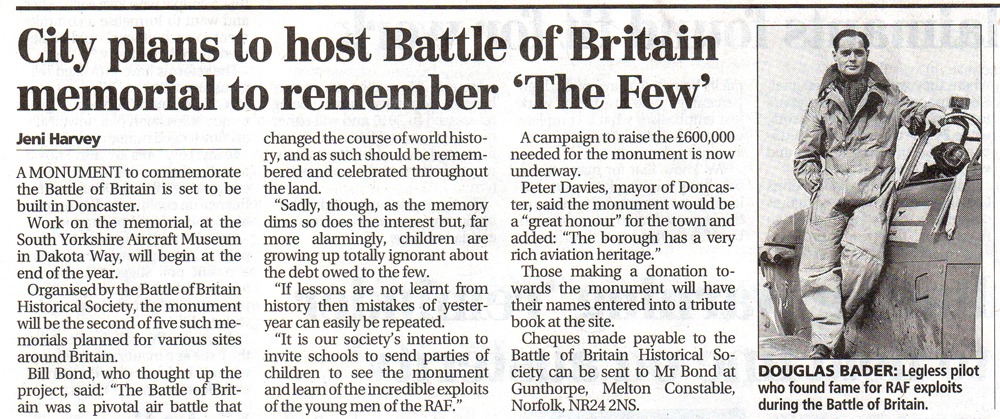
City plans to host Battle of Britain memorial to remember ‘The Few’
Published on Friday 16 March 2012 06:00
A MONUMENT to commemorate the Battle of Britain is set to be built in Doncaster.
Work on the memorial, at the South Yorkshire Aircraft Museum in Dakota Way, will begin at the end of the year.
Organised by the Battle of Britain Historical Society, the monument will be the second of five such memorials planned for various sites around Britain.
Bill Bond, who thought up the project, said: “The Battle of Britain was a pivotal air battle that changed the course of world history, and as such should be remembered and celebrated throughout the land.
“Sadly, though, as the memory dims so does the interest but, far more alarmingly, children are growing up totally ignorant about the debt owed to the few.
“If lessons are not learnt from history then mistakes of yesteryear can easily be repeated.
“It is our society’s intention to invite schools to send parties of children to see the monument and learn of the incredible exploits of the young men of the RAF.”
A campaign to raise the £600,000 needed for the monument is now underway.
Peter Davies, mayor of Doncaster, said the monument would be a “great honour” for the town and added: “The borough has a very rich aviation heritage.”
Those making a donation towards the monument will have their names entered into a tribute book at the site.
Cheques made payable to the Battle of Britain Historical Society can be sent to Mr Bond at Gunthorpe, Melton Constable, Norfolk, NR24 2NS.
© 2012 Jeni Harvey/ Yorkshire Post




